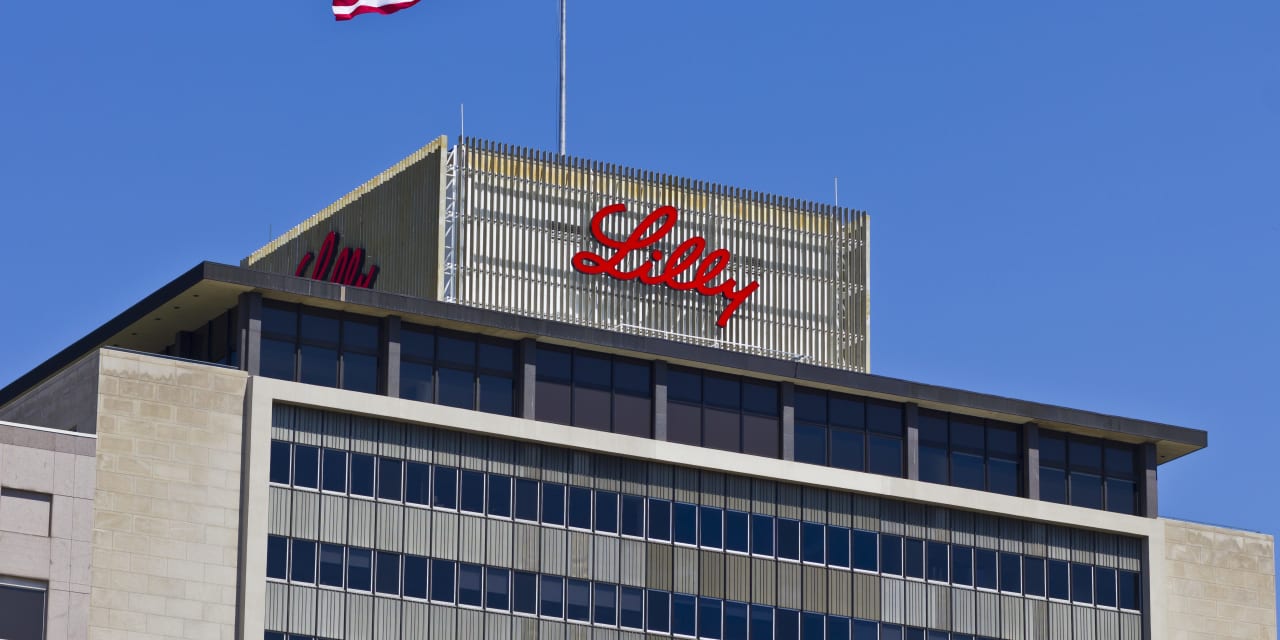Eli Lilly
has thrown the first jab at
Novo Nordisk
in the commercial showdown between the drugmakers’ highly effective weight-loss treatments, the newly-approved Zepbound and Wegovy.
When Lilly (ticker: LLY) announced Zepbound‘s Food and Drug Approval on Wednesday, it went out of its way to note the drug’s list price of $1,059.87 a month—or nearly $13,000 a year—was “approximately 20% lower” than the list price of Novo’s (NVO) Wegovy.
The poke at its main rival in the anti-obesity drug race points to Lilly’s ambition to take on Novo, which is a few years ahead in its rollout of the new weight-loss drugs. Sales of Novo’s Wegovy, which lists at roughly $16,000 a year, were $3.1 billion in the first three quarters of 2023, and are expected to climb sharply in coming years.
While Zepbound’s price tag is lower than that of Wegovy, it isn’t actually all that low. It’s slightly above the roughly $12,000-per-year list price of Lilly’s Mounjaro—which is the same medicine as Zepbound, but sold as a Type 2 diabetes treatment. It’s also higher than the list price of Novo’s Ozempic—the Type 2 diabetes version of Wegovy—at roughly $11,000 a year.
The price difference between Zepbound and Wegovy seems unlikely to have an enormous impact on prescribing decisions. For starters, both companies are likely years away from meeting demand for these drugs because of supply constraints. That means a bigger question for patients in the near term could be which drug their pharmacists can find, rather than which they prefer.
Lilly, for its part, says it had employers at top of mind when setting Zepbound’s price. Its strategy seems aimed at getting more employers to agree to pay for its drug. Many insurers have balked at paying for anti-obesity drugs, under the theory that obesity is a lifestyle choice, though Novo executives said early this month 50 million Americans now have access to Wegovy through their commercial insurance plans.
As Barron’s reported in September, the costs of Wegovy and Zepbound could provoke a spending crisis, given the high price of the medicine and the tremendous potential demand. The strain of paying for the drugs could pressure Medicaid budgets, and raise premiums for employers and workers.
Much of the debate around drug pricing in the U.S. focuses on the role of pharmacy-benefit managers, the middlemen that negotiate with drugmakers on behalf of insurers. Drugmakers often hand sizable rebates to the pharmacy-benefit managers, who base decisions on how to cover a medicine on the size of the rebate.
That dynamic means pharmacy-benefit managers at times actually prefer drugs with higher list prices over cheaper alternatives, since the higher list prices mean higher rebates.
Lilly executives said Wednesday, however, that the intended audience for their lower list price for Zepbound was employers who will decide whether to cover the drug for their employees—and not the pharmacy-benefit managers who stand in the middle of the transaction.
“As we were talking to the end payers, like the employers, they said that the list price was something that was a factor in their decision to expand access,” Michael Mason, Lilly Diabetes president, said on a media call Wednesday. “And so that was a big role.’
In an analyst note Wednesday, TD Cowen analyst Steve Scala wrote that for obesity drugs to be covered on a particular insurance plan, both employers and pharmacy-benefit managers need to opt in. Scala wrote that Lilly believes employers—who don’t necessarily see the net prices negotiated by pharmacy-benefit managers—might be swayed to go with the lower-list-price drug.
Employer coverage of Zepbound is even more essential for Lilly because Medicare coverage seems unlikely in the near term. By law, Medicare is currently barred from paying for weight-loss drugs.
On the media call Wednesday, Lilly CEO David Ricks said the company is testing Zepbound in sleep apnea and other indications, and could get access to that population through approvals in those conditions.
“Those may present opportunities to expand access to tirzepatide for those conditions in Medicare, if not for obesity directly,” Ricks said, using the generic name for Zepbound. “Watch that space.”
Lilly shares fell 3.6% on Thursday in the wake of the Zepbound approval.
Write to Josh Nathan-Kazis at [email protected]
Read the full article here




